Corruption By Any Other Name – Oliver DeMille
April 25th, 2014 // 10:41 am @ Oliver DeMille
Another Domino Falling
JP Morgan recently settled a case brought by the government, agreeing to pay Washington $13 billion for its role in the mortgage bubble meltdown.
Morgan recently settled a case brought by the government, agreeing to pay Washington $13 billion for its role in the mortgage bubble meltdown.
This creates a very dangerous standard. When something bad happens, Washington will naturally seek to find fault in a place that brings it a lot of extra cash—the most profitable businesses.
As Ken Kurson put it:
“This settlement sets a terrible precedent. Companies with strong balance sheets can expect to become targets of the government…”[i]
This is another domino in the decline of our freedoms, and it’s a big one. This new approach allows, even incentivizes, government corruption. Let’s review how this process works:
- The federal government passes laws that require or incentivize businesses to give loans or offer services/products to people who can’t actually afford them. Businesses that refuse are penalized.
- As a result of this kind of bad policy, many businesses fail. Businesses that comply, but only make middling profits, are left alone.
- Businesses that comply, and make big profits, are targeted by the federal government and end up paying huge sums of money to the government.
Godfather Over Again
This is a great racket. It’s akin to a mafia protection scheme: “You need protection from us. We’ll provide it, for a fee. The fee will be set by us, without appeal or negotiation. If you don’t pay it, we’ll hurt you and/or your business—thus proving that you really did need protection.”
An official term for this new precedent is “corruption.” Except that the Supreme Court gets to determine the actual definition of the word. And who gave the Court the power to do this?
The Supreme Court did, in a string of cases starting in 1803 through 1936.
Is this recurring pattern starting to make sense?
“Wait,” the critics say. “The crash was real! And JP Morgan and other companies that participated need to pay! Right?”
As Kurson wrote:
“Of course, most of JP Morgan’s wrongdoing—70 to 80 percent of the exposure—was committed by two companies, Bear Stearns and Washington Mutual, it acquired in 2008 at the request, to the point of command, of then-Treasury Secretary Henry Paulson. JPM acquired those companies as acts of mercy during a crisis.”[ii]
Let’s get this straight. The economy was tanking, so the government demanded that JP Morgan buy two flailing firms—to help save the economy. Then, when the fall came, the government targeted JP Morgan for the mistakes of these two firms and made it pay for them.
Godfather corruption indeed.
Who It Hurts
How are businesses responding to this emerging new economy? Many are closing. Others are going abroad, to China, India, Brazil, etc. Those that make enough from the U.S. economy simply pay the fines, settlements, and fees—it’s the cost of doing business.
The real problem is for American workers and families. JP Morgan has increased its litigation reserve up to $23 billion (from $3 billion in 2010).[iii] Other companies are learning to do the same.
What happens when the extra billions are refocused this way? Money moves away from salaries and purchases, the economy is hurt, private sector jobs are cut or curtailed.
The government is currently seeking similar payoffs from a number of other big companies. As this precedent sends its ripples through the economy, it will harm a lot of families.
More firms will move operations and jobs abroad, and others will shift more money from jobs and put it to litigation and fees.
Old Pattern, New Cloth
Oh, and just re-read the government’s pattern outlined above for the mortgage bubble, but this time read it with Obamacare in mind:
- The federal government passes laws that require or incentivize businesses to offer services/products to people who can’t actually afford them. Businesses that refuse are penalized.
- As a result of these bad policies, many businesses fail. Businesses that comply, but only make middling profits, are left alone.
- Businesses that comply, but make big profits, are targeted by the federal government and end up paying huge sums of money to the government.
This really is as shocking as it sounds. Yes, this really is happening in the United States.
The worst news in all this is that most people will do nothing about it, because this kind of financial news is considered technical mumbo jumbo.
Citizens usually just ignore it. “What can I do, after all?” is the typical response.
This is how freedoms decline: slowly for a while–then all at once. The amazing part is that when the “all at once” crash comes, almost everyone acts surprised.
But what can a regular person do? Really? It’s not like you can stop government overspending, party bickering, or a growing culture of corruption with a call to your Congressman or a letter to the editor.
The answer to this major post-modern question (What can a regular person do?) is interesting: We can start with not being surprised.
Problems and Solutions
We can know what is coming. A government addicted to spending and borrowing, and constantly increasing its spending and borrowing, is going to cause problems for the economy and for its citizens.[iv]
A government addicted to increased regulations is going to cause problems.[v]
A government that demands official secrecy from its own people while increasing how it spies on its own citizens is going to cause problems.[vi]
A government that inflates its currency and borrows from its biggest enemies and competitors is going to cause problems.[vii]
A government whose top officials routinely make promises during elections or to pass big agendas and then break them once they win is going to cause problems.[viii]
A government that uses statistics it knows distort reality (just revising them a few months later once decisions have been made), in order to support its continued ideological course, is going to cause problems.[ix]
A citizenry that turns a collective blind eye to these realities is enabling the very problems it fears. Then the people claims surprise when the crash comes.
Anyone who is surprised by the next crash has been lying to themselves for a long time.
False Recovery
As Allan Greenspan wrote in November 2013:
“One can hope that in a future financial crisis—and there will surely be one…”[x]
Calomiris and Haber noted that banking crises should be expected:
“The banking system in the United States has been highly crisis-prone, suffering no fewer than 14 major crisis in the past 180 years.”[xi]
The question isn’t if, but when, the next one will come.
Or consider what J. Bradford DeLong wrote in a piece in Foreign Affairs titled “The Second Great Depression: Why the Economic Crisis is Worse Than You Think”:
“The U.S. economy has enjoyed a recovery [since 2009] only in the sense that conditions haven’t gotten worse…. But it is unlikely that the economic downturn will be over by 2017…”[xii]
Greenspan suggested the second thing people can do. He wrote:
“Financial firms could have protected themselves…if…they had prepared for a rainy day.”[xiii]
Though he addressed this belated counsel to companies, it certainly applies to regular people as well.
Time and Two Steps
To summarize, we have covered two things a regular person can do about our current problems. First, know about them. Pay attention. Keep a close eye on the government, the economy, and current events. Read the fine print and the technical mumbo jumbo put out by government.
The English word for this daily activity and focus is “citizenship.”
The second is to prepare. Look around, see what is really needed, and what is likely to be needed in the years ahead—and take action to help your community flourish.
Not just for you, but for others.
The word for this kind of initiative and foresight is “entrepreneurship.” It isn’t pessimistic, doomsayer, or extreme. In fact, effective entrepreneurialism is precisely the opposite.
It only works if it is optimistic, positive, and sustained.
Without such citizenship and entrepreneurialism, the decline of freedom is only going to accelerate. We’ve still got time for these two things to work, but time is running out.
[i] Ken Kurson, “The Portfolio,” Esquire, February 2014.
[ii] Ibid.
[iii] Ibid.
[iv] See, for example, Edward Conard, “How to Fix America: Which Tools Should Washington Use? Unleash the Private Sector,” Foreign Affairs, May/June 2013. See also: Fareed Zakaria, “Can America Be Fixed?: The New Crisis of Democracy,” Foreign Affairs, January/February 2013. For example: “In 1980 the United States’ gross government debt was 42 percent of its total GDP; it is now 107 percent.”
[v] Ibid. For example, the United States is ranked 76th in the world for its “burden of government regulations.”
[vi] See Jack Shafer, “Live and Let Live,” Foreign Affairs, March/April 2014. “[A]ccording to the White House review panel convened last year to examine the NSA’s surveillance practices, the bulk collection of phone records has stopped precisely zero attacks.”
[vii] See, for example, Minxin Pei, “How China and America See Each Other: And Why They Are On A Collision Course,” Foreign Affairs, March/April 2014. For example: “In 2007, the United States’ economy was four times as large as that of China; by 2012, it was only twice as large.”
[viii] E.g. “If you want to keep your doctor, you can keep your doctor.” See also: Michael A. Cohen, “Hypocrisy Hype: Can Washington Still Walk and Talk Differently?” Foreign Affairs, March/April 2014.
[ix] See Zachary Karabell, “(Mis)leading Indicators: Why Our Economic Numbers Distort Reality,” Foreign Affairs, March/April 2014.
[x] Allan Greenspan, “Never Saw It Coming: Why the Financial Crisis Took Economists by Surprise,” Foreign Affairs, November/December 2013.
[xi] Charles W. Calomiris and Stephen H. Haber, “Why Banking Systems Succeed and Fail: The Politics Behind Financial Institutions,” Foreign Affairs, November/December 2013.
[xii] J. Bradford DeLong, “The Second Great Depression: Why the Economic Crisis is Worse Than You Think,” Foreign Affairs, July/August 2013.
[xiii] Op Cit., Greenspan.
Category : Blog &Business &Citizenship &Community &Current Events &Economics &Entrepreneurship &Leadership &Liberty &Mini-Factories &Mission &Politics &Uncategorized
Funny: Imagine a Different America
April 17th, 2014 // 8:01 am @ Oliver DeMille
Joke for Thought
The column was a joke (literally).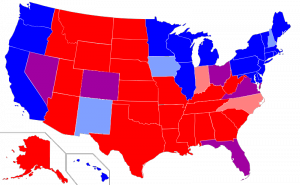 But in addition to being funny, it really says some very interesting things.
But in addition to being funny, it really says some very interesting things.
Written by Joel Stein in Time magazine (March 24, 2014), it is a blueprint for how the United States should break into two separate nations.
Consider some of what Stein wrote:
• “We should peacefully break into two countries, one made of red states and one of blue. The red one would still be called the United States of America, since it would otherwise have to alter the lyrics of every song its citizens know. The blue one would be renamed something racially inclusive and long and hard to remember. The Exceedingly Long-Named Country would be free to have the laws it has always griped about not being able to pass. Instead of guns, the cops would carry Change.org petitions.”
• “Once the blue states were their own country, they would develop a better appreciation for the South, as a foreign country they could visit when Mexico seemed like too much effort and Canada too little…. A place with the best breakfasts in the entire world. Where it’s easy to navigate since everyone speaks English, but figuring stuff out is still a bit of a fun challenge because, after all, it’s not really English. A place where you can shoot guns, drive cars with combustion engines and drink beer that isn’t painfully bitter—all at the same time.”
• “This split would in no way prevent Southerners [and Westerners] from vacationing up North for the same reasons they always have: they have relatives there and have no choice.”
Again, though meant as a joke, this describes some of the real differences between the Blue and Red states. Klein continues:
• “The South…could pass laws every month not to raise its debt ceiling since, let’s face it, no one is going to lend a Southerner money.” The North “could make environmental treaties with foreign nations about how to extract natural resources, since they’ll have no natural resources anyway.”
Very funny.
The Un-United States
What’s missing in Stein’s fictional proposal is how the southern red states and the western red states will get along. Since they won’t, they’ll just split too.
And what about the swing states? Florida, Ohio and West Virginia have a lot more in common with each other than most of their geographical neighbors, so maybe they’ll break away and create a fourth nation.
Colorado is part of the blue states anyway, so geography is already archaic in the new system.
But that’s just the beginning. Nevada and Utah are basically the opposite of each other, but Nevada is also the opposite of California—in a totally different way.
Nevada can’t co-exist well with either, but it can connect with Arizona and Montana.
Texas will probably want to its own nation. And that’s just the start…
Time to Stop Laughing
The more I think about it, the less funny it is. People who just want Washington to get along sometimes miss a key truth: the conflict in Washington is a lot less extreme than the conflict would be between capitol cities of competing nations.
As John Jay wrote in Federalist Paper 5:
“Should the people of America divide themselves into three or four nations…envy and jealousy would soon extinguish confidence and affection, and the partial interests of each…instead of the general interests of all America, would be the only objects of their policy and disputes. [Afterwards], like most other bordering nations, they would always be…involved in disputes and wars [with each other].”
The result, Federalist 5 said, would be, first, that America would be weak against all its foreign enemies, and second, the new blocs of states would be dangerous “and formidable only to each other.”
Why Washington Feels Broken
Sometimes it’s nice to sit back and laugh at ourselves.
Yes, Washington can be a frustrating, angry, and dysfunctional place, but it could be a lot worse. Southern and Northern California could be two separate nations, for example. Or Michigan and Ohio. Atlanta and Athens, Georgia. Manhattan and the Bronx.
Talk about conflict. The thought makes Democrat versus Republican feel tame.
The U.S. is not, at it’s essence, federal. The Founders created the federal government as a national security entity that would protect, and loosely cobble together, thirteen distinct states.
When the federal government tries to homogenize fifty unique states, treating them with a one-size-fits-all mentality, the result is dysfunction.
Washington feels “broken” today because it is. It is trying to do something it was never designed for.
 Oliver DeMille is the New York Times, Wall Street Journal and USA Today bestselling co-author of LeaderShift: A Call for Americans to Finally Stand Up and Lead, the co-founder of the Center for Social Leadership, and a co-creator of TJEd.
Oliver DeMille is the New York Times, Wall Street Journal and USA Today bestselling co-author of LeaderShift: A Call for Americans to Finally Stand Up and Lead, the co-founder of the Center for Social Leadership, and a co-creator of TJEd.
Among many other works, he is the author of A Thomas Jefferson Education: Teaching a Generation of Leaders for the 21st Century, The Coming Aristocracy, and FreedomShift: 3 Choices to Reclaim America’s Destiny.
Oliver is dedicated to promoting freedom through leadership education. He and his wife Rachel are raising their eight children in Cedar City, Utah.
Category : Blog &Citizenship &Community &Culture &Current Events &Foreign Affairs &Government &Politics
How to Deal With the BLM (A Modest Proposal)
April 15th, 2014 // 12:53 pm @ Oliver DeMille
by Oliver DeMille
Here a -Gate, There a -Gate
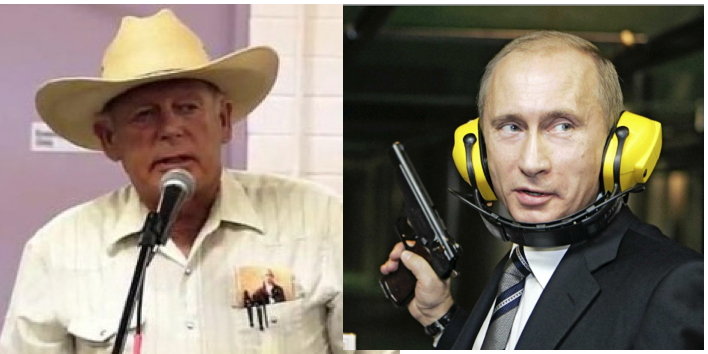 The IRS targeting scandal and BLM-gate in Nevada hit the news again this week. If you missed these two huge stories, do a quick web search and catch up on the news. Both may be precursors of a Constitutional crisis. Add the shocking turn of events (and aftermath) surrounding Benghazi as well.
The IRS targeting scandal and BLM-gate in Nevada hit the news again this week. If you missed these two huge stories, do a quick web search and catch up on the news. Both may be precursors of a Constitutional crisis. Add the shocking turn of events (and aftermath) surrounding Benghazi as well.
The truth is, there is a fundamental problem with the way our government works right now. It is structurally broken, and without a real fix things are going to continue to decline. Washington and its out-of-control agencies and branches will continue to expand—breaking the bank and reducing the freedoms of our nation with every advance.
The problem is that the President and Executive Branch are engaged in domestic policy. Period. The framers only wanted the President to deal with national security.
This is a massive change, and it creates an almost insurmountable national crisis.
As long as this is our system, national crises are going to continue. Like dominoes falling, we’ll witness once crisis after another.
People will wonder why Washington can’t get it right, but few will realize the truth: The federal government simply isn’t well designed to do what it is doing. It is designed to be tough on foreign enemies, to leave interactions with its own citizens to the state and local governments.
What’s Washington “For”?
This bears repeating until every American figures it out:
- The federal government is designed to stop foreign attackers.
- It is designed to keep the President from becoming a tyrant while he still has enough massive power to effectively repel any security threats to the nation.
- It is designed with a congress that has the power to ensure that the states help fund and support whatever it takes to stop any attacks on the nation.
- It is designed to allow the Court to settle disputes between the states in a peaceful manner.
These are, fundamentally, all the federal government is supposed to do. This is how the Constitution was written.
Today the federal government acts like these Constitutional responsibilities are just minor duties, afterthoughts really–as if funding and managing myriad federal programs in every walk of life and in every small town or valley, home and business across the nation is their real job.
As long as this is the case, America will decline.
On the one hand, we’ll decline because Washington too often uses its power stupidly—sending the BLM to shoot a rancher’s cattle or using the IRS to investigate political rivals. But this is natural to a government that was set up to fight its enemies.
The Executive Branch thinks like what it is: a national security apparatus.
And in the context of security issues, the Congress thinks like what it is: an arm to raise funds for the Executive and simultaneously keep the Executive from becoming tyrannical.
All of this is excellent when it is pointed at real threats to America. How about: use the resources of the BLM, IRS, ATF, FDA, etc. on Iran, Iraq, North Korea, China, Russia? See how Putin deals with that!
Misdirection
The truth is, the tactics used by many of our federal agencies would be much better suited against Putin’s Russia than our current international policies.
Sadly, they are used more often against our own people than against our adversaries. Sic the NSA on the phone records of China and Iran, not Burbank or Atlanta.
When the national security apparatus (which should be synonymous with “Washington D.C.”) targets Americans, it does so in the wrong way. It was never designed as a government to oversee its own people. The framers structured it specifically for national defense.
The states and local governments were supposed to do the governing of the people. Read the Constitution. Read the Federalist Papers. This focus was clear.
The second problem, the second reason our system is broken, is that in focusing on domestic governance (unconstitutionally), the federal government is less likely to do its real job—national security.
Why do we send federal agents against a rancher in Nevada or conservative groups applying to the IRS, but send nobody to protect our diplomats in Benghazi?
The federal government has forgotten why it exists.
It spies on its own people, but does nothing except bluster as Iran fails one nuclear inspection deadline after another.
Domestic policy and politics get in the way every time the Congress or the Executive Branch want to do what really should be done for national defense.
We let Putin or China get away with, literally, murder and torture because our federal leaders are afraid to take a stand that might jeopardize them politically.
Here’s a thought…
If the federal government only dealt with national defense, including mitigation of disputes between states, it wouldn’t have this concern. It would take Putin on with strength—the way the ATF and BLM deal with American citizens.
The irony here is shocking.
We putter around with true dictatorship such as North Korea and Iran, and try to make friends with raw aggression from Russia.
The federal government talks big against Putin and China, but it only actually bares its teeth when faced by a one of its own senior citizens and a few cattle.
Again, the Constitutional structure is going unheeded. Until we simply follow the Constitution, our decline is assured.
But what can we do? What are the realistic policies or changes that can fix our plight?
It’s great to talk about the ideals of the Constitution, but what about real solutions?
I agree–we need real changes. So here’s my proposal:
Let’s convince the Obama Administration and Congress to round up all agents who carry guns for the BLM, ATF, IRS, NSA, FDA and any other federal agency and ship them to the Ukraine.
This won’t consist of sending “military” forces because they’re not soldiers, they’re bureaucrats.
It won’t hurt the United States, since the absence of thousands of meddling federal officials will likely cause an economic boom in America.
It will be a real blow to Putin’s aggression, however. They U.S. bureaucrats speak his language.
They’ll cite policies, procedures, precedents, and email/phone data they’ve been secretly collecting on Ukrainians for many years. Putin’s people won’t know what hit them.
When the Russians threaten violence, our “Bureau Team Six” will just make up their own laws, agency rules, and executive orders and enforce them.
No matter how the Russian generals respond, they’ll have an answer: “Who cares what the people on the ground think?” “Who cares what the Constitution says?” “Logic and common sense? What’s that got to do with anything?” “Come on, Putin, just do what we say.”
If all else fails, Bureau Team Six will just write up some new policies and print them out on their laser printer. Then they’ll point to these “laws” and tell the Russians that this is agency policy with the full backing of the U.S. federal government.
Indeed, this Corps of Really Armed Bureaucrats (CRABs) is already highly trained in the exact tactics that will put Putin’s power grab in its place.
When they’re done in the Ukraine, let’s send them to North Korea. They should be able to shape things up quickly.
Then on to Iran.
Back at the Ranch
Meanwhile, the economy at home will be booming.
Less regulation will foster more opportunity.
Fewer dogmatic enforcers will encourage innovation and increased prosperity.
International investors will move their money to American businesses, and employment and salaries will increase.
It’s amazing how quickly things can be fixed when we simply follow good principles. The Constitution is actually a really good idea. We should consider following it.
Conclusion
Satire aside, our system really is broken, and nothing will fix it until the federal government gets out of the governing business and gets back to focusing exclusively on national security. If this is too big a change, then the U.S. cannot stand as a free nation.
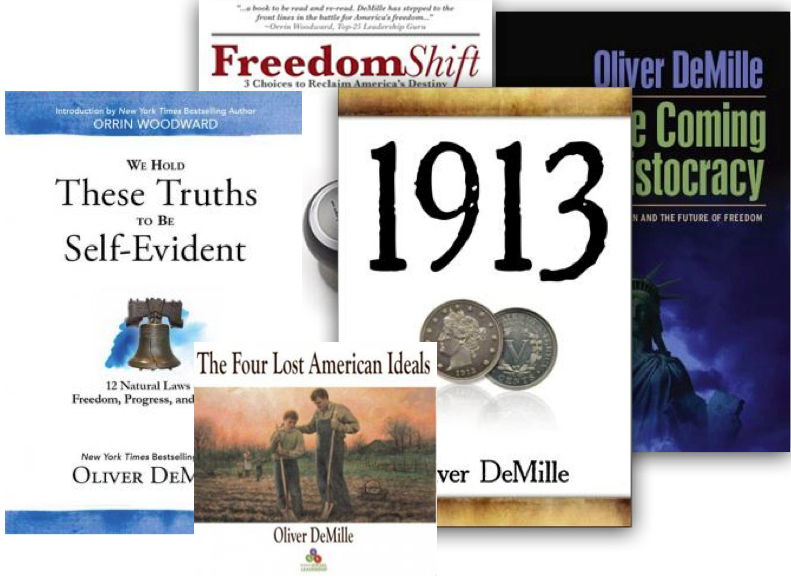 For more on how “regular citizens” can preserve freedom, see Oliver’s Freedom Bundle:
For more on how “regular citizens” can preserve freedom, see Oliver’s Freedom Bundle:
- FreedomShift
- 1913
- We Hold These Truths to be Self-Evident
- The Coming Aristocracy
- The Four Lost American Ideals
Click here for more information >>
 Oliver DeMille is the New York Times, Wall Street Journal and USA Today bestselling co-author of LeaderShift: A Call for Americans to Finally Stand Up and Lead, the co-founder of the Center for Social Leadership, and a co-creator of TJEd.
Oliver DeMille is the New York Times, Wall Street Journal and USA Today bestselling co-author of LeaderShift: A Call for Americans to Finally Stand Up and Lead, the co-founder of the Center for Social Leadership, and a co-creator of TJEd.
Among many other works, he is the author of A Thomas Jefferson Education: Teaching a Generation of Leaders for the 21st Century, The Coming Aristocracy, and FreedomShift: 3 Choices to Reclaim America’s Destiny.
Oliver is dedicated to promoting freedom through leadership education. He and his wife Rachel are raising their eight children in Cedar City, Utah.
Category : Blog &Citizenship &Constitution &Current Events &Foreign Affairs &Government &Leadership &Liberty &Mini-Factories &Politics &Statesmanship
What Will You Be Doing After the Coming Crash?
April 3rd, 2014 // 6:01 pm @ Oliver DeMille
After the Storm
What happens when a nation crashes? This is a fascinating question.
As people discuss the decline of nations comparisons are drawn to the fall of the Roman Empire or the fall of the Ottoman Empire, and so on.
But what happened in the years after these falls?
Of course, the first answer to this question is: that it depends on the severity of the crash or fall.
Every recession or depression, every big war or other calamity is, in a sense, a crash. In this way, 9/11 was a crash, as was the economic crisis of 2008-2010.
In setbacks like these, nations and people suffer, but they eventually get back on their feet.
After the stock market crash of 1929, the nation thought it was getting back to normal, slowly, for over a decade. Today we call this era the Great Depression, but at the time it didn’t look like the whole society had crashed. It hadn’t, though it certainly went through a very difficult time.
It wasn’t until Pearl Harbor, 12 years later, that the nation realized that almost everything and everyone would change.
The Three Types of Crash
After World War II, many things truly were different. We lived in a new nation, so to speak, with permanently altered values, economy, institutions, and vision for the future.
Some changes were arguably good for the nation, others not so much. The same kind of major fall/crash had occurred during the Civil War era and earlier at the time of the American Revolution.
Thus we have “serious” crashes of the Vietnam, Watergate, 9/11, and Great Recession variety, and also even more “major” crashes at the level of the Civil War and World War II.
If either type of crash comes at any point in the next decade, it will have a drastic influence on our lives, families, and national future.
When people speak of “the coming crash,” or “the crash,” in contrast, they usually seem to mean something more along the lines of the fall of Rome or the Ottomans—a truly world-shattering change, with the big powers almost shut down and other world players stepping up to fill the vacuum of power.
This third kind fall or crash is a Black Plague event, where a third of the population dies, or equivalent, and everything about the politics, economy and culture suffers drastic changes.
The Answer
So, now that we’ve defined three levels of crash events, how do we answer the original question? What will happen if we experience a crash or fall during the next decade? Answer:
- If we have a Minor crash event (e.g. recession, or 9/11 level), we will see an economic downturn, lots of layoffs and fewer jobs, many full-time jobs downgraded to part-time, less buying power due to inflation. The middle class will continue to shrink, and the lower classes will grow. Much U.S. capital will flee to international markets with better returns and less government red tape. Government programs and dependency will expand, and the gap between the wealthy and the rest will widen.
- If we witness a Major crash event (e.g. a great depression, a major war, etc.), we’ll experience everything in the list above, but two to five times more severe. It will be like a minor crash event but with a lot more impact.
- If we live through a Cataclysmic crash event (e.g. a Pompei-style natural disaster or a fall of Rome level collapse) it could go a number of directions. The results might be kept to major crash event levels with the right leadership, or they could be truly apocalyptic, where everyone goes back to farming and trading, or marauding, as their daily occupations.
Cycles and the Next Decade
It is interesting how many people—though still a minority—feel strongly that a Black Plague-level crash is coming soon to America. And of the people who reject this, who think this idea is extreme, it amazing how many of them fail to seriously consider how sure a Minor or even Major crash event is in the next ten years.
At the very least, a Minor level crash will happen. At least one such event will occur during the decade.
Why am I so sure? Because such an event occurs at least once during every decade. This is just the passage of history.
A Major level crash event might happen during the next decade—it is more likely than at any point since Pearl Harbor—but it might not.
If no such event transpires, the cycles of history predict that it will certainly happen sometime not too far in the future.
The third level, a true Cataclysm, is much harder to predict. Forecasters will call it highly unlikely right up until it happens, then it will seem obvious that it was coming all along. This pattern has repeated many times.
Part II
How does any of this information help us?
To begin with, it is at the very least interesting that when a Cataclysmic crash comes it turns everyone into farmers, entrepreneurs, or marauders. Maybe these are really the three ways of making a living, after all – in any society – even during peaceful times like ours.
This would mean that engineers, accountants, attorneys, teachers, and every other career are really one of the three—right now. Very enlightening, when you think about it.
Which is your focus? Which do you support in your daily efforts? This is extremely valuable information, because it helps you see what changes are needed now, before an upcoming crash event at any level.
Preparing for the Storm
Next, there are certain things we can do to prepare that will be extremely helpful in all three scenarios. This is where our focus should be, at least for most of us.
- First, great education will help anyone think like a leader. This is hugely helpful in every possible scenario for the future. Those who have read the great classics, who understand the Great Conversation, who have cultivated the skills (mental, emotional, relational, and physical/practical) will know how to lead and what to do—whatever comes.The worse the crash, the more important the emotional, physical and practical skills.
- Second, successful entrepreneurialism creates resources, builds connections and relationships, and fosters an environment where more people think and act like leaders.In difficult economic times, it will be those with effective entrepreneurial experience who help create jobs and products that turn things around. This is a proven law of history.
- Third, getting involved at the local level, making connections with local leaders, is helpful in preparing for times of economic downturn or other potential disaster.When societies turn more to local leadership, your involvement and relationships can have a significant influence. Just attending city council, chamber of commerce, or other meetings of this kind can start this process. People nearly always underestimate their influence on a local level.
All three of these things will be much more effective if we start doing them before times of trouble. Those who wisely take action prior to difficult eras are the natural leaders when any level of crash/fall/downturn comes.
Winston Churchill called the time before World War II the “Calm Before the Storm.” Such a calm, like the world we now live in, doesn’t usually seem very calm at all.
But compared to what comes later, it is a time to prepare.
Are you taking advantage of this time? Specifically, how have your reading of great classics, your entrepreneurialism, and/or your community involvements increased in the last few months? How will they increase in the months ahead?
Leadership and wisdom are all about foresight, and taking action.
Whatever the future brings, these three ventures will make you a better leader, parent and friend in the times ahead.
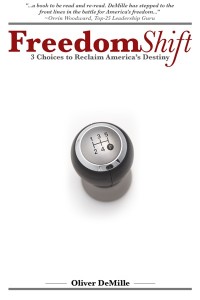 For more on how “regular citizens” can preserve freedom, see Oliver’s book FreedomShift:
For more on how “regular citizens” can preserve freedom, see Oliver’s book FreedomShift:
Americans who are so demonstrably willing to labor and sacrifice for the benefit of their posterity can only allow the destruction of the forms that protect our freedoms if they do not understand what freedom is, nor how to maintain it.
A FreedomShift is needed today; and to accomplish it, Oliver DeMille proposes The 3 Choices to Reclaim America’s Destiny.
Can it be possible that such a peaceful revolution can be accomplished by three simple choices made by a relative few?
Click here for more information >>
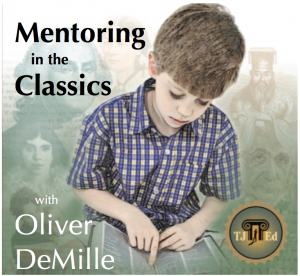 To get a whole new level of great leadership education, join our Mentoring in the Classics course, taught online twice monthly by Oliver DeMille. To learn more, click here >>
To get a whole new level of great leadership education, join our Mentoring in the Classics course, taught online twice monthly by Oliver DeMille. To learn more, click here >>
 Oliver DeMille is the New York Times, Wall Street Journal and USA Today bestselling co-author of LeaderShift: A Call for Americans to Finally Stand Up and Lead, the co-founder of the Center for Social Leadership, and a co-creator of TJEd.
Oliver DeMille is the New York Times, Wall Street Journal and USA Today bestselling co-author of LeaderShift: A Call for Americans to Finally Stand Up and Lead, the co-founder of the Center for Social Leadership, and a co-creator of TJEd.
Among many other works, he is the author of A Thomas Jefferson Education: Teaching a Generation of Leaders for the 21st Century, The Coming Aristocracy, and FreedomShift: 3 Choices to Reclaim America’s Destiny.
Oliver is dedicated to promoting freedom through leadership education. He and his wife Rachel are raising their eight children in Cedar City, Utah.
Category : Blog &Community &Current Events &Government &History &Leadership
The Cool Factor in Presidential Elections: Oliver DeMille
March 25th, 2014 // 2:34 pm @ Oliver DeMille
Choosing a Candidate
“Americans elect the ‘cool’ candidate as president in the Entertainment Age. Carter was more cool than Ford, Reagan was cooler than Carter and Mondale, Bush I was cooler than Dukakis but not as cool as Clinton, Clinton was cooler than Dole, Bush II was more cool than Gore and Kerry, and Obama was cooler than McCain and Romney.
“A simple ‘cool’ test (who is more likely to sing, dance, play the saxophone, fuel high school ambitions in the youth, etc.) would have accurately predicted every one of these elections. It’s high school musical at the White House. As for the 2016 presidential election, no potential candidate so far is nearly as ‘cool’ to a majority of the national electorate as Hillary Clinton. Nobody is even close.”
This thought touched a chord with many, and I’ve been asked to elaborate on it. So here goes.
The electorate wants a cool president, but one with at least a little experience in government. If Republicans are going to win the White House in 2016, they need a cool candidate — cooler than Hillary Clinton.
The 2016 Players
There is precedent for things moving quickly in presidential politics. Barack Obama wasn’t even on the national scene until 2005, three years before he won the presidency in 2008. Whoever can beat Clinton in 2016, needs to be elected to high office in 2014 (or before).
Some people think that one of the current Republican Governors or Senators can win in 2016, but no candidate has risen to a level of cool that will compete with Clinton.
Some conservatives try to deal with this by arguing that the electorate should change the way it chooses a president—and I agree—but this isn’t likely.
In current America, the “coolest” candidate will win. To date, the Republicans have nobody really cool in this sense.
By the way, a candidate doesn’t have to be actually cool, just cooler than the opponent. And Hillary Clinton is the standard for 2016. Arne Duncan is a close second for Democratic cool, with Timothy Shriver just behind.
That’s three Democrats that are cooler than any known Republican right now.
To get more specific, in the current electorate, winning the White House means being seen as the most cool candidate by women, Latinos, and independents. Rand Paul, Paul Ryan, and Sarah Palin are considered cool by many independents. Just as many independents like Hillary, however, and she also polls higher with Latinos and women.
Extreme Makeover: White House Edition
Marco Rubio, Ted Cruz and Jeb Bush are considered cool by many Latinos, but not as cool as Clinton, and Hillary leads among women and independents. Chris Christie, Bobby Jindal, Scott Walker, and Mitt Romney are behind Clinton in all three of these swing groups.
The entire list of Republican potentials is seen as less cool than Hillary. If Republicans want to have any chance in 2016, either some new face needs to rise in 2014, or a past leader who can project as genuinely cool needs to effectively re-enter the fray.
For example, Scott Brown might be able to pull it off. Condoleezza Rice might compete well with Clinton, if she could get through the Republican primaries (she won’t).
Jon Huntsman might present himself as cool—more dirt bike and less boring policy wonk—but he’d need a public makeover. A lot of those listed above, including Rand Paul, will need such a makeover if they want to compete with Hillary. Ben Carson or any other newcomer would have to act now.
It’s way too early to call a national election, of course, but if Republicans don’t raise up a cool leader in 2014 who can compete for the White House in 2016, the executive election is all but over already.
Since this person hasn’t yet caught the national attention, 2014 is the last chance for them to win an election.
 Oliver DeMille is the New York Times, Wall Street Journal and USA Today bestselling co-author of LeaderShift: A Call for Americans to Finally Stand Up and Lead, the co-founder of the Center for Social Leadership, and a co-creator of TJEd.
Oliver DeMille is the New York Times, Wall Street Journal and USA Today bestselling co-author of LeaderShift: A Call for Americans to Finally Stand Up and Lead, the co-founder of the Center for Social Leadership, and a co-creator of TJEd.
Among many other works, he is the author of A Thomas Jefferson Education: Teaching a Generation of Leaders for the 21st Century, The Coming Aristocracy, and FreedomShift: 3 Choices to Reclaim America’s Destiny.
Oliver is dedicated to promoting freedom through leadership education. He and his wife Rachel are raising their eight children in Cedar City, Utah.
Category : Blog &Citizenship &Current Events &Government &Independents &Leadership &Liberty &Politics











